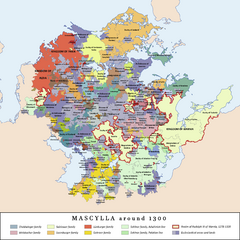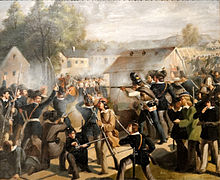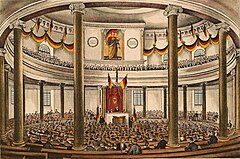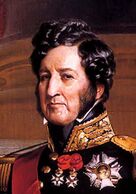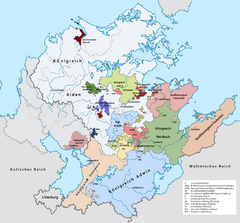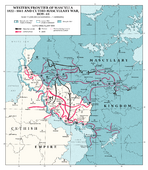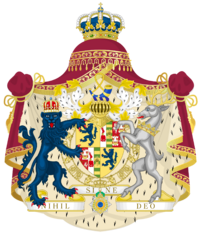History of Mascylla
This article is incomplete because it is pending further input from participants, or it is a work-in-progress by one author. Please comment on this article's talk page to share your input, comments and questions. Note: To contribute to this article, you may need to seek help from the author(s) of this page. |
The area of what is now Mascylla was originally inhabited by a collection of Telmerian tribes, most notably the Therunds (Terunder), Falians (Fahlier), Aldens (Aldier) and Adhuins (Adhuiner) since classical antiquity. Following ill-fated attempts by the Cambran Empire to expand northward beyond modern-day Dulebia in the 2nd and 3rd centuries AD, and its subsequent collapse in the aftermath of the Migration Period by 300 AD, the newly founded Albarian Kingdom annexed southern Mascylla while introducing Cambran innovations and customs to the region and developing a distinctive culture and language as the basis for modern Mascyllary culture.
The presence of the Albarians prompted the slow creation of duchies and states from the Mascyllary tribes, and by 1000 AD most of Mascylla had been organized into a patchwork of petty kingdoms and duchies. Soon after, religious disputes and a prolonged series of dynastic disputes dominated Mascyllary politics in the Middle Ages, increasingly influenced by growing predecessors to the First Cuthish Empire and Loxstedt-Hoeveden Monarchy.
After the Adwhinish Wars and War of Kalaphay Succession in 1569 and 1603 respectively, two nations had emerged as regional powers, Aldia and Adwhin, vying for hegemony over the remaining Mascyllary states, with Aldia rapidly rising with a colonial empire it had acquired from Cuthland in the 1700s. The hostilities between both nations began to grow and, following the gradual dwindling of power of the Cuthish Empire in the latter 18th century that left a power vacuum in Mascylla's central provinces, three consecutive wars of unification were fought in the 1740s, 1760s and 1770s respectively. The epitome of violence would be reached in the War of the Five Kings from 1789 to 1793, with Aldia, leading a confederacy of states against Adwhin and ultimately emerging victorious. The subsequent Treaty of Langquaid negotiated the unification of Mascylla into a nation state with a continuation of the Aldian monarchy through Lukas I at its helm. The collapse of Cuthland and its slow periods of partition enabled Mascylla to vastly expand its Berean as well as Pamiran and Alvinian influence. Moreover, Mascyllary culture and commerce flourished by the turn of the 19th century, and the Aldian colonial system expanded into a global colonial empire that was the second largest by the 1830s. However, with the rise of the Second Cuthish Empire under Edwin III and following the Second Cutho-Mascyllary War (1839–41), Mascylla was utterly defeated and forced to cede pre-1758 Cuthish territories in Mascylla as well as a portion of its colonial possessions.
The ensuing antagonization by the Mascyllary populous and the mutual hateship between both countries that had developed over the last two hundred years was a decisive factor in the causing of the Great War (1911–16). As a major participant and ultimately victor of the war with the Armala Coalition, it set the terms of peace, crippling Cuthland's military, economy and territorial extent, as well as reshaping the geopolitical order through the establishment of the Assembly of Nations in 1917. War-torn conservative Mascylla however succumbed to increasing calls for reform by the worker class, with the Mascyllary Revolution overthrowing the to this point de facto absolute monarchy and instituting a democratic republic with a constitutionally regulated monarch in 1924. An unprecedented economic boom in the 1920s and 1930s quickly recovered the damaged economy while solidifying the recently introduced democracy.
The enmities left by the Great War proved to be pivotal in the later course of the 20th century, when a re-organized Cuthland leading the Mageiros League and X rivaled the western democratic nations united by the BDTA after 1944. While Mascylla kept clinging onto its colonial possessions, the Melasian Crisis from 1941 to 1943 triggered the slow decolonization of its empire as well as the beginning of the Great Game (1944–1990). The 1960s and 1970s saw civil unrest and dissatisfaction with the country's policies, and additional terrorist movements and scandals further coalesced into a national insurgency, culminating in the July 20 1991 terrorist attacks. After numerous attempts of reconciliation by the democratic and communist blocs and following the 1987 stock crash and financial crisis, the X collapsed, leaving Cuthland and Mascylla as the two remaining rivals of the former Great Game. Recent reapproachment with post-communist states beginning in the 1990s however kept diplomatic tensions between the two at bay.
Prehistory

The oldest evidence of the presence of the species Homo on Mascyllary territory date back atleast 500,000 years, and permanent presence to the south of the country is exptected to have begun 390,000 years ago. Homo geisahlensis is named after the city close to the site of its discovery. The atleast 200,000 years old Storßener Speere und Messer (Storßen Spears and Knifes) are the oldest entirely preserved hunting tools of humans yet discovered and marked a radical shift in the understanding of neolithic social development in the 1990s. The arrival of Homo sapiens, the anatomically modern human, having immigrated from Caphtora, marked the sudden dissapearance of all humans in Telmeria 14,000 years ago, though recent studies suggest all human species had joint descendants; this era also saw the zenith of the Upper Paleolithic revolution.
Coming from the Middle East and migrating through Dulebia to Telmeria, Neolithic farmers with their domesticated animals and plants slowly displaced the hunters and gatherers of the Mesolithic period in southern Mascylla by 5,500 BC. The cultures of hunters, collectors and fishermen to the north of the country remained resilient, but ultimately adopted the methods of the now sedentary, agricultural Western Linear Pottery cultures to the south in approximately 3,800 BC. With over 500 years of delay, the Bronze Age in Mascylla started 4,700 years ago and produced a wide range of artifacts and tools, most famously the Sky Disc of Halie discovered in 1990. The begin of the X period in 2000 BC marked the gradual end of Proto-Dentrian inhabitation and the rise of iron as the preferred working material. By 600 BC, the first considered modern Hesurianic cultures had already formed in northern Mascylla, and towns such as Falkenhall, Dalbeck, Rothnau, Bützow and Augusthal became the oldest continuously inhabited settlements in Mascylla. Ancient authors first used "Hesurians" as a ethnographic collective term in the 1st century BC.
Telmerian tribes and antiquity
The Cambran Empire organized and attempted numerous actions of expansion up the northern Telmerian peninsula between 100 BC and 300 AD, mainly from its positions in modern-day Dulebia on the River Dnistr. Provisional legion camps were initial seeds in the establishment of early centres of administration and society in southern Mascylla, namely Lannbrück (originally founded as Laneaum), Konreid (Conria) and Südhaven (Hamentum). After the incursions of the Aldens and Welbarians in 320 AD the Migration Period put an end to the Cambran Empire, constituted the dramatic change from late antiquity to the Early Middle Ages and helped shape several historic tribes in Mascylla such as the Aldens, Chenians, Therunds, Warnons and Adhuins.
In the wake of the end of the Triumvirate of Cambra, numerous Hesurianic Cambran successor states formed on its territories, the most influential of which in Telmeria was the Welbarian Kingdom. While the centre of power and population was located in Dulebia, it had a significant influence on the Mascyllary tribes present, as it introduced late Cambran culture, judiciary and artwork and prompted them to merge into several proto duchies. From approximately 450 AD until the early 7th century AD, the areas west of the Lanne and south of the Blaugold belonged to the Welbarian Kingdom, and from 580 to 620 AD also parts of modern-day Elpsland (Nordmark) as well as most of today's Holnia. Cities such as Konreid, Pehlgau, Lannbruck, Lubbernau, Steglitz, and Sudhaven, which are among the oldest cities in Mascylla, date back to the Welbarians.
After 700 AD, the Welbarian Kingdom dwindled in power following the separation of the Kingdom of Aldena and left a vacuum of power by which feudalism became the dominant policy and five principal tribal duchies Adwhin, Fahnicht, Folneria, Falia and Wenilia were formed. The following three centuries saw the rise of territorial fragmentation of Mascylla ("Kleinstaaterei") and decisive defeats of the invading Pomorians, largely with the Battle of Moosfeld in 903.
Middle Ages
Regnum Cheniaticorum
In the 9th century AD, Pomorian groups migrated up to the Lahr-Lanne-line into the disputed settlement areas of Hesurianic tribes. The prestige win of Adwhinish duke Adalbert II following the successful retalation against the Pomorians in 903 boasted a new Mascyllary dynasty of now kings which ruled over the individual duchies of the 1000s, named the Adalbertian dynasty (Adalbertanierdynastie). Though it gained enough traction to reign as sovereign of Mascylla, the Semitar church in Cambra awarded the entity the title of regnum Cheniaticorum ("Kingdom of the Mascyllary") but refrained from referring to it as an empire (Imperium) in order to relativize the claims of sovereignty from its Cambran successors. The title and kingdom was preserved until the 12th century and is generally seen as the origin point of the "modern" Mascyllary history.
Otto II of Mascylla claimed the royal dignity of Welbaria in 1020 and forcefully tried to unite his regnum Cheniaticorum with Imperial Rovina (Reichsrovinen) to the south, in hopes of establishing a western "Cambran" empire (Kämbrisch-Hesurisches Reich). Briefly, this empire grew to encompass a hegemonious position in Telmeria from 1000–1030. His military campaign proved disastrous however, and was forced to dissolve his kingdom in exchange for his ducal title of Adwhin by Aldena in 1039, ending any hopes of a unified Mascyllary empire of Cambran descent.
Fracturing and competition

Numerous feudal rulerships came at the cost of a regal imperial power in the form of territorial states, and thus made consensual rule impossible for much of the 12th and 13th centuries: Duke Richard II of Adwhin failed with an attempt to rule as Mascyllary emperor de iure uxoris as hereditary monarch of the Markiner dynasty. The gearing of worldly and spiritual power prohibited his actions through the imperial church system (Reichskirchensystem) which triggered the Regal Contest of 1217 between church and state. The devisive nature of the debate led to Richard's downfall and further diversitification of Mascylla's countdom after the interregnum of Adwhin's dukes. However, visions of a joint federation of states under an elective monarchy never ceased to infest policies of several influential dukes throughout the Middle Ages. The most notable conflict surrounding that debate arose when in 1262 King Dilisme I of Warnia attempted to force the Archbishop of Langquaid to concede to his claim on the imperial crown; the war left the lasting impression of Mascyllary familiarity and the Concord of Rothenthur in 1306 formally defined Mascylla's territories as an ambiguous "empire" or "Reich". Coinciding dynastic disputes expanded the conflict to Dilisme's War which ultimately ended in stalemate and was partially resolved with the Peace of Westmarke in 1297, which pardoned Dilisme of his actions, forced him to surrender his imperial crown, and ensured his kingdom would serve as regal protector of all of Mascylla (Reichsprotektor) as compromise throughout the 14th century.
The ensuing rivalry among Mascylla's major royal houses, the Salzlowers, Sohlnarers and Welsbachers, kept tensions between Mascylla's states high and provided for intricate plays of power. The 14th and 15th centuries Late Middle Ages were dominated by crises such as the Black Plague, agricultural mass mismanagement (Famines of 1339 and 1401) and the gradual rise of the bourgeoisie which led to the formation of free merchant cities (Freie Reichsstädte).
Social changes and Renaissance
The transition to the Renaissance marked the end of the Salzlowers as paramount Mascyllary monarchs, the rise of the Welsbachers as Grand Dukes of Welsbach and the entry of the House of Loxstedt-Hoeveden via the emerging First Cuthish Empire derivings its origins from Aldena and Dulebia of the 16th century. Through delicate maneuvering, it gained expansive territories in Mascylla as Berean great power and eventually gained the legitimacy as Imperial Protector, putting the struggle of achieving unity under a Cambran Hesurianic sovereign to rest.
The 16th century saw efforts by Cuthland to sustain a universal monarchy with its holdings in Mascylla, descendance from Aldena and Dulebia and a large colonial empire, and the transition of several Mascyllary states to Berean powers, most notably the Kingdom of Aldia and Duchy of Adwhin, with their own colonies and political ambitions. Conflicts of dynastical interest intensified and occured more often, including the War of the Eustrian Succession 1588–1605 and the Delcian War 1642–1653, and the effects of the Enlightenment of the 18th century was tromendous for Mascylla's politics and society.
Early modern Mascylla
Aldian and Adwhinish rivalry

For much of Mascylla's history, it remained divided into numerous principalities and states on the basis of its frequent warfare and battle of pre-dominant royal dynasties vying for eventual unification. The rivalry between its two most powerful and influential states, the Kingdom of Aldia and Electorate of Adwhin, was largely derived from a strategic enmity following the collapse of the First Cuthish Empire and the partition of its Mascyllary and broader Telmerian territories by them. The states ruled by members of the House of Loxstedt-Hoeveden became irritated over their political future, and large territories were ceded to either Aldia and Adwhin, which nurished considerable debate and discussion. The conclusion of the War of Cuthish Succession in 1740 predetermined the future rivalry of Aldia and Adwhin.
The rivalry first surfaced belately when Albert I of Adwhin subsequenly assumed control over the Duchy of Phalagay and crowned himself king in 1710. While Leopold of Phalagay, a member of the House of Loxstedt-Hoeveden-Kingsham, left no male heirs before his death, Albert brought forth his distant kinship to Leopold and succeeded him as Duke of Phalagay. However, not every Mascyllary state was compliant with this dramatic shift in power, and among those Wilhelm II of Aldia. In exchange for his recognition, Adwhin was expected to cede Dorsace, which it had just acquired from the Cuthish Empire with the beginning of the War of the Cuthish Succession, to Aldia on the basis of dated treaties. On 5 August 1710 he therefore proposed an ultimatum to Albert I. Without awaiting a response of the ultimatum, Aldia invaded Dorsace on 8 August 1710 after brieftly besieging Saarow, igniting the Dorsace War and additionally War of Phalagay Succession. The Adwhinish were not successful in prohibiting Aldia from annexing Dorsace, but retaliated through major military engagements in Eustria. The indecisive Battle of Heiseln on 14 October drove Albert I to initially seek a truce with Aldia, also in order to win the War of Phalagey Succession to the south. The Diet of Seifritz and Peace of Augusthal of 1711 ensured Aldia's gains of Dorsace as well as the County of Herrshausen, but in turn its acceptance of all of Dorsace's debt.
The war left political disputes largely unresolved, and spurred territorial expansionism of Aldia, enboldened by their recent acquisitions. It embarked to marry its relatives to other states and join them with Aldia, which saw a gradual transition from a lesser power to a Mascyllary gargantuan, backed by its colonial possessions. Coincidentally though, Adwhin rose as well when Albert I's sucessor and brother, Karl IV, implemented radical reorganizations of his army and administration to bolster its strength as a Mascyllary power. Adhwin also spurred efforts to justify its objective as "a right to unite Mascylla", implementing the legacy and myth of Mascyllary unification as an inevitable fate.
Elbgau Confederacy and unification
Slow coordination


With the amplifying tension between Aldia and Adwhin following a row of conflicts in the mid-18th century that left the political dispute of Mascyllary nationalism unresolved, Albrecht II of Aldia envisioned a new political unit to coordinate customs, integrate the states' economies as well as boasting friedship among its members in order to efficiently tackle Adwhin together. The Congress of Rehnern in December 1757 concluded with the establishment of the Elbgau Confederation, of which 12 states were initial members. Greatly upsetting Adwhin's plans of expanding its influence through dynastic ties in central Mascylla, it quickly orchestrated a move to deepen relations with its close neighbours such as the Kingdom of Holnia or Tudonia through the marriages of Princess Claudia of Merich-Karlsburg to the heir, Friedrich, of King Julian of Holnia, and Prince Theodor to the daughter of Grand Duke Joseph of Tudonia.
While unionists and nationalists saw the recent solidification of two large blocs as a victory and step towards unification, sovereign rulers repressing national beliefs were increasingly frustrated they would be eventually in the midst of a conflict between both sides; the fear of loosing significance or independence triggered a series of new inclusions to the Elbgau Confederacy which inadvertibly sped up Mascylla's unification. The additional creation of the Nordmaskillischer Zollverein (customs union) would further encroach on the division of Mascyllary states.
Nationalist actions and Revolutions of 1769
The results of the Congress of Rehnern in 1757 gave new motivation to the long existing movement of Mascyllary nationalism and single statehood. Various student movements and groups, most notably Junges Maskillien of the University of Tilchingen, sought to promote their belief of Mascylla's "right to be united", while heavily denouncing the Cuthish Empire's political and economic influence in Mascylla by the 1760s. While the states did not support nor represent the ideals of the growing movement, they allowed it to be distributed to the public without foreign intervention from authorities. However, numerous radicalizing groups attempted revolutions in Phalya in 1759 and Shwesia in 1765 respectively, to directly push for unification processes in broader politics, but also to establish representative government and in some cases the introduction of enlightened absolutism to its monarchies, in tandem with calls for reform and change in Cuthland and Falland.
While the movement remained a fringe group of activists, their goal conincided with the political ambitions by both Aldia and Adwhin, who exploited their public popularity to bolster their vision of a united Mascylla under the leadership of their respective monarchies. Aldia emerged more sucessful with this approach however, when Aldish king Albrecht II promoted an influential leader of the movement in Aldia, Franz Kohlner, to the status of consultant to the government. While alienating the conservative members of the nobility and government, Albrecht amassed the support of the educated middle class, and following the institution of numerous reforms that brought Aldia towards a monarchy with enshrined enlightened aspects, it used its image as leverage and justification for its future leadership of Mascylla.
The social and politial discontent by reformists in other parts of Mascylla led to attempts by them to duplicate the success in Aldia. Subsequently, the July Revolutions of 1769 led to the occupation of military forts and the collapse of a number of small duchies reformed into representative democracies, the most notably of which the Republic of Konreid in 1769 and the Lorenz Republic in 1773. A council of representatives from the new states, members of the Elbgau Confederacy and other activists was assembled in Langquaid in September 1773 to draft a constitution for a unified Mascylla (Langquaider Reichsverfassung), later implemented as the charter of the Confederacy itself. In the south of the country, the revolutions were largely repressed by military force, and most of the movements were initially dissolved and exiled, with many of them fleeing north into Aldia.
War of the Five Kings and Mascyllary unification
The destabilizing effect of the attempted revolutions throughout the state further increased tension between the two coalitions led by Aldia and Adwhin. The economic integration of the two blocs additionally led to a sharp increase in economic prosperity and wealth, but on the cost of the Elbgau Confederacy needing natural resources and vital trade routes to continue its expanding economy, thus making a conflict due to the geopolitical and strategic importance of central Mascylla inevitable. The death of the aging Albrecht II and the ascension of his son and heir, Lukas I, who was vehemently in favor of national unification due to his father's efforts, was the turning point in Mascylla's history.
In March 1789, the Grand Duke of Phalya, Karl IV, suddenly died but left no apparent heir and the throne vacant. Aldia quickly suggested an Ahnern candidate, Lukas's brother Leopold, as Phalya's successor, but Adwhin, recognizing the topographical importance of Phalya, aggressively objected and pushed for King Theodor's nephew, Prince Maximilian, to succeed Karl IV. The issue quickly evolved into a diplomatic fiasco, and on 4 September 1789, Adwhin issued to resolve the conflict through war. While Adwhin quickly invaded Phalya, the Elbgau Confederacy was able muster a larger standing army under the command of Feldmarschall Wilhelm von Stenreck, supported by a growing number of civil militias trained and equipped by Aldia. The conflict quickly escalated into a full-scale war and it became apparent the Elbgau Confederacy and its allies would emerge victorious. After numerous victorious battles in Eustria and Phalya over the course of two years, the Battle of Austerlitz in May 1790 was a decisive blow to the Adwhinish armies protecting the fortress of Austerlitz, completely eradicating the bulk of its land army and capturing King Theodor himself. While Aldia continued to advance further south, Franz Kohlner and a trail of thousands of petty soldiers, peasants and activists, collectively known as the "Expedition of the Thousands" (Zug der Tausenden) marched onto and invaded Breisgau, Adwhin's seat of government.
Shortly thereafter, Adwhin capitulated without any peace terms and representatives of 32 Mascyllary states and free cities gathered in Langquaid to decide the political fate of Mascylla. Lukas I of Aldia was chosen to ascend the title of King of Mascyllla, the Elbgau Confederacy dissolved, and its member states as well as the defeated nations merged into a Mascyllary state. A rigorous debate erupted as to how the political system of Mascylla would actually be structured; a majority of states from the south who had a conservative point of view advocated for an enlightened, but absolute monarchy, while the peasantry, middle class and a number of northern states favored a democratic republic with a monarch as its figure head.
Fearing the southern states would rebel and eventually secede from Mascylla, Lukas I drafted a compromise betweeen both parties, in which the monarch would have considerable power but be advised and kept in check by elected members of government. While this compromise resolved the ongoing dispute of Mascylla's governance, Lukas had own personal aspirations as a leader of power and therefore detested being removed political powers. Franz Kohlner as an influential political figure first strongly opposed his proposal, but reluctantly agreed later on, burying the nation-wide hopes of a democracy for a century. The treaty itself was signed and ratified on 18 May 1793 after months of negotiation. Subsequently, Lukas I was officially coronated in Langquaid to the largest audience of nobility in Mascylla's history.
While the war itself was short, it left a devastating toll on the civilian population and southern economies who suffered from taxation and looting during the conflict. The government was largely composed of war veterans, such as Wilhelm von Stenreck being elected as Mascylla's first Prime Minister, though former Adwhin and other southern states were deeply in debt, inpoverished and virtually politically unrepresented, culminating in a series of strikes and riots in 1795 which were quickly put down by Aldian military forces. However, Mascylla witnessed an unprecedented economic rise, and Lukas I massively grew in public popularity with the introduction of a new row of statutes that satisfied the expanding middle class of classical liberalists and nationalists who continued to rise in influence in national politics and commerce, while the country's separate monarchies were slowly replaced by constitutional systems.
Mascyllary Kingdom
Stenreck era
The Mascyllary Kingdom was the brainchild of King Lukas I and his Prime Minister, Wilhelm von Stenreck, upon its foundation in 1793. While the government of the new state was intended to establish the rule of the people under the supervised reign of a monarch, in reality both collaborated in splitting political duties and exchanging policy proposals and ideas, which as a matter of fact greatly bolstered Mascylla's political efficiency and rapid rise in international power. However, Lukas' impulsive actions were checked and regulated by Stenreck, who relied on more expertise in being a statesman and later constituted an intricate foreign policy that would ensure Mascylla's security as a unified nation while exercising its geopolitical ambitions, commonly known as his Ruhe, aber graulen policy ("Be calm, but growl" policy).
While considerably unpopular due to his hardline domestic conservative policies, he signed into law universal healthcare and education, boasted the country's war-torn economy and was able to command enough respect in his government for him to largely shape Mascylla's political landscape throughout the first half of the 19th century.
Lukanism and political ambitions
With the deterioration of Stenreck's health by the 1820s, Lukas I assumed a more significant portion in the country's policymaking, while increasingly relying on the Reichsrat as an advistory body alone, which further alienated his former liberal and reformist allies in the elected components of government. When he finally died in 1832 however, his more ambitious and impulsive son, Lukas II, ascended the throne and redefined a large number of Stenreck's previous delicatly introduced policies. Aspiring to expand Mascylla's foreign and economic powers, he abandoned Stenreck's foreign policy, pursuing colonialist ambitions primarly in Pamira and Caphtora, which at this point were largely absent of Berean colonial presence. While at first unilaterally approaching Berean politics, his successors sophisticated the expansionist ideals of Lukas II, while embarking on approaching other powers it saw fit to combat its primary political enemy, the Cuthish Empire, that ultimately became a major factor leading to the Great War.
Cuthish Revolution and rise in power

Mascylla at first had a resentment towards intervening in other Telmerian conflicts concurrently with its unification, the most notable rejecting such ambition being Wilhelm von Stenreck. Lukas I at first remained reluctant as to whether it should intervene in the Cuthish Revolution at first, but the bulk of representatives of parliament foremost denied any involvement with foreign wars if Mascylla's own countryside had not been rebuilt and its political unity settled.
When the deposed Algar III of Cuthland however offered his restoration as Cuthland's monarch in exchange for a portion of its Berean and overseas territories, Lukas I pushed for a more prominent stance in Berean affairs, and with solidifying his rule and Mascylla's legitimacy especially in the country's south, he convinced Stenreck to overrule the Reichsrat and ratify the Ulich Agreement in February 1798, which saw the Mascyllary Kingdom entering the Cuthish Revolutionary War as its first military campaign and recognizing the Cuthish king's legitimacy in deposing its young democracy, which was widely seen as a threat to its just established monarchy.
While the war was at first successful with territorial gains in northern Cuthland for much of the conflict, Mascyllary cities such as Birchau and Vogtburg were sacked by Cuthish republican forces in 1799. Nevertheless, the republic was overthrown and the war concluded with the Cuthish monarchy's victory. The Treaty of Swithtun in 1800 saw Cuthland's third and last partition, with Mascylla annexing large territorial cessions by Cuthland, including the northern Cuthland regions and all of its remaining Alvinian and most of its northern Pamiran colonial possessions. The war elevated Mascylla to a great power in an instant and motivated imperialist politicians and nobility to argue for continuous colonial expansion and dominance of Telmerian politics, to the dismay of classical liberalists who advocated to consolidate Mascylla's pre-existing power and limit its interventionist attitude, in line with Stenreck's policies.
Second colonial empire and the Gründerjahre (1800–1840)
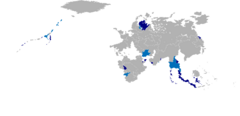
Over time, the political legitimacy of the monarchy and government had hardened and politicians began to experiment with numerous courses for domestic and foreign policy. With the worsening health of Stenreck, his power withered and was slowly taken over by more ambitious statesmen, supported by the too eager Lukas I who aspired to expand Mascylla's bulk of power in Berea and overseas in order to cement his legacy. His son, Crown Prince Lukas II staunchly rejected Stenreck's reserved approach to Telmeria and favorited to continue what he described to be a "continuous expansion of the Mascyllary nation" most notably in Pamira and Caphtora. Around this developing political objective, a group of conservative and monarchist politicians established the first political party of Mascylla, the National Democrats, a predecessor to today's National Democratic Union, which dominated Mascyllary politics for well of the 19th century. The reign of Lukas II was shaped by the introduction of loyal statesmen who he thought to be able to project his political ambitions, restore the war-damaged economy and consolidate his father's legacy to bolster support for the monarchy.
The Mascyllary colonial empire, formerly under Aldian control, developed from numerous attempts and stepstones: Caphtoran and Pamiran trade outposts and towns with little territorial extent and vaious Alvinian islands which had been explored and settled to establish plantations and mines. In the early 19th century, the colonies had almost no domestic political value and furthermore little economic importance; however, the accelerating growth of local populations (more than triple by 1850 than in 1810) soon challenged the weight of the metropole within the empire. Political interest also rose with an increased rivalry among Berean colonial powers over yet unclaimed territories which were further fueled by the aftermath of the Karsk Sea War and Conference of Aniarro in the 1860s, including the expansion of the Mascyllary colonial empire at the cost of collapsing Cuthland.
A series of small-scale wars and skirmishes with other colonial powers, most notably Lavaria and Sarrac, and numerous colonial tribes and petty kingdoms in Caphtora and Pamira dempered romanticism and prestige of an emerging colonial power, but were quickly compensated through successful and expansive campaigns in Cunucca and Mavronesia, which gave rise to the largest Mascyllary colonial possession, Melasia, in 1830 and 1832 respectively. Falland emerged as the primal colonial enemy in the mid-19th century, frequently exchanging hostile actions and souring relations between it, Mascylla and Lavaria.
Although exerting a large strain on Mascylla's home economy and political capital, it soon acquired enough resources in natural wealth and man labour to bolster its economy, which steadily grew by half in the next twenty years from 1830 to 1850. The emergence of the Second Industrial Revolution in the early 19th century also transformed Mascylla's economy to this point: the sharp increase in manufactured goods led to an explosion of the upper class' consumption and a larger gravance for raw resources, which enabled Mascylla to use its colonies as trade ports to buy and sell their goods while exerting influence on regions and territories with a wealth of resources desperatly needed in the metropole.
In the following ten years, Mascylla rapidly grew to the second-largest economy on the planet thanks to its expansive colonial system and trade agreements with native states abroad. The colonial empire had exceeded Mascylla's expectations and ambitions in catapulting the country to the status of a great power of Berea within thirty years.
Cutho-Mascyllary enmity and 1847 revolution
After the partitions of Cuthland and the increasing agrivation of Cuthish and Mascyllary leaders greatly disturbed their relations in spite of a massive shift in power by the Cuthish collapse and rise of Mascylla, which was further deepened following Mascylla's aggressive foreign policy and expansion brought about by Lukas II and Friedrich von Gäste. Stenreck and his political adversaries were deeply concerned about the abolition of the delicate policies set in place to ensure Mascyllary sovereignty which was now endangered. Ultimately, that proved to be true when Cuthland under the rule of Edwin III and the ensuing Ahlstead Wars signaled the now Second Cuthish Empire's stance on recovering its territories lost to mainly Dulebia and Mascylla.
The resulting Second Cutho-Mascyllary War in September of 1839 was quickly decided as Cuthland scored a row of military victories, dispersing a Mascyllary army and encircling another one at Augusthal. The bulk of Mascylla's standing army was defeated in Vogtburg a month later and opened the opportunity to encircle and besiege Königsreh in spring of 1840. The hastily organized counter defences were however able to force the besieging army to disperse and capitulate after a crop failure and unrest in the Cuthish armies, but to no avail as Königsreh was forced to capitulate in summer and a provisional government willing to sign a treaty of surrender at Marienfelde. As a result of the negotiations, and formally declared by the Treaty of Alderport, Mascylla was forced to pay reparations and indemnities of 4 billion karnings and cede Elpsland and Dorsace to Cuthland, as well as a number of colonies primarly in Alvinia.
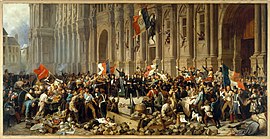
Following the desastrous outcome of the war, the current political establishment and the monarchy under Lukas II in particular earned growing criticism and unfavorable review for the rising influence of the middle and lower class, anticipating a class conflict. The discomfort of the fiercly nationalistic populous, paired with a government that grew more authoritarian and conservative, led to the rise of an insurrectionist movement originating in Königsreh, later known as the Cornflower Uprising of 1847. The bloody revolt, though ultimately unsuccessful at last, prompted other riots, especially within the country's military, to rise up and seek the overthrow of Lukas II.
The 28 October coup d'état, largely supported by the peasantry and rogue military factions, deposed Lukas II as King, and despite fierce resistance by the government and elements of the coup originally seeking to overthrow the monarchy entirely, elected Sophia I as Queen. The Reichsrat of 1847 was suspended by her and a new government later formed. The revolution, later known as the October Revolution in Mascylla, primarly introduced further protections and rights for the socialist peasantry, and bolstered support in the existing administration after the coup.
The war left Mascylla, its political administration and military deeply humiliated, which was previously considered to be one of the most well equipped and organized Beream armies. Reluctance over accepting the conclusion, revanchism and already significant popularity of an expansionist Mascylla further exacerbated the Cuthish–Mascyllary enmity and became a key factor in Mascylla's foreign policy going from 1842 onward. Therefore, Mascylla underwhent a dramatic transformation from an isolated and humiliated power, to the centre of a system of Berean alliances intended to counter the growing influence and friendship of Cuthland and the Dulebian Empire by the turn to the 20th century. It established the Otimo Acordo with Lavaria in 1900, subsequently with Sarrac in 1901, and four years later normalized and eased tensions with Falland through the Fallish-Mascyllary Alliance. Its colonial empire also gave way to a more federated version with the establishment of the Federated Melasian States in 1904 as a Dominion of the empire.
Neuzeit
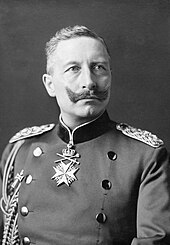
The Neuzeit (lit.: 'new age') was a product of the renewed strength and prosperity from its alliances and continued peace in the late 19th century. Due to prolonged economic growth, relative peace and cultural, political and scientific innovation by its populous, Mascylla reinstituted a state of wealth and being a Berean leader in not only military, but also societal and commerce affairs. Simultaneously, the invention and introduction of popular amusements brought about by scientists and innovative artists, most notably the motion picture and art styles of Impressionism and Art Nouveau, aided in Mascylla preserving its place as a centre of arts and expression. Additionally, events such as the Universalausstellung of 1891 hosted in Königsreh was an opportunity for the country to present its most recent scientific discoveries, inventions and research. These and other developments, often sponsored by the government itself, were attempts at constituting the bulk of soft power for the Mascyllary state in solidifying its influence not only in its colonial empire and political power, but also culture and technology.
Nervertheless, Mascylla remained deeply divided on terms of ideology, foreign policy, regionalism, economic growth and distribution, and the classes, which became a more frequently addressed subject with the introduction of the emancipation of the worker class in political process through the Proletarian Party under Georg Schmidt in the 1890s and the increasing polarisation of the debate on women's suffrage, the bourgeoisie caste and the political legitimacy of the states' monarchies.
Great War and Revolution of 1923
Great War (1911–1916)

Mascylla did not expect war when the Great War came about, as Prime Minister Hermann Wilhelm Fürst von Martinsen began attempts of reconciliation and political détente with the Lindenau Accord in 1904, albeit with fierce resistance by a majority of the Reichsrat and King Ludwig I himself, who opted to resort to open hostility if necessary as soon as possible. While Mascylla remained divided as to whether to anticipate a war with Cuthland or facilitate the improvement of relations, it became very active in international affairs by intervening in the Third Dulebo-Gurkhan War in 1899-1902 and the X, to the dismay of Martinsen who witnessed a counteracting movement in foreign policymaking while undermining the government's policies.
When the X triggered a complex network of alliances and treaties, it drew every Berean power, including Mascylla, into conflict within the first few weeks. While Mascylla was militarily superior in 1911, Cuthland was more efficient and effective at organizing its armies and planning a decisive strike on Mascylla's western defences in Aldia. In September of 1911, Cuthish forces under the command of X swiftly defeated the armies garrisoned at Saarow and Geißdorf, which prompted the Mascyllary Kingdom to hastily muster their defences without prior tactical decisionmaking. Therefore, the Cuthish were able to penetrate Mascyllary defences at their border and sweep into the Fanian Plain, quickly gaining military control over important industrial regions in Mascylla, in hopes of pressuring Mascylla to capitulate non-conditionally. While the campaign was very successful within the first four months in curbing combat opportunities of Mascylla such as in the First Battle of Augusthal in late 1911 and the Battle of Winden in 1912, the decisive Battle of Lückwalde proved the Mascyllary forces under Friedrich von Gabig and Ehrhard von Belau could resist the Cuthish advance and save the capital from a siege. Subsequently, the Northern Front began to solidify with the emergence of trench warfare and increasing war-weariness. The less intense fighting along the southern frontier toward Valimia and Cuthland also became static in late 1913.
In 1915 to 1916 however, after the assassination of Martinsen by Paul Debicki, the utilization of the tank, and improved war tactics were finally able to break the stalemate of the front, and swift but often intense fightings caused tromendous casualties and often times pyrrhic victories. The Mascyllary were able to push beyond its borders and well into Cuthland, near Kingsham and Alderport by spring of 1916, before the Cuthish signed the Nordingen instrument of armistice on 29 May 1916 and Mascylla ended effective fighting three days later.
Interwar period

The Armala Coalition imposed their terms on primarly Cuthland in the Treaty of Lehpold, hosted by Mascylla, in 1916–17, in which they intended on forcing Cuthland to pay exorbitant sums of war reparations, demilitarize heavily and abolish its monarchy. Mascylla had the prevailent say in the treatment of Cuthland in the negotiations, and opted to treat it harshly. It regained the territories of Elpsland, Dorsace, and West Aldia lost in 1840, received reparations in the form of war material, financial assets and industrial goods, and occupied Cuthland's Lake Sigismund region. Various Cuthish territories were ceded to create the independent state of Temaria, the Mandates of Konreid and Alderport, as well as Lilienburg. Furthermore, Mascylla received the Mandates of Northern Alvinia and Pandalam in Alvinia and Cancapore from the remains of the Cuthish colonial empire as well as the Mandate of Transappiria of the former Gurkhan Empire and Kenlong itself. The treaty laid out the framework of a genuine Berean peace under the established Assembly of Nations in 1917.
In the interwar years, Mascylla initially pursued a policy of Lake Sigismund security (occupation of Alderport in 1919). In the 1922 general elections, Rähner's cabinet lost its majority; a non-partisan "National Bloc" (Nationalblock), united in its hard-line policy against Cuthland, formed a minority government under Bernhard Graf von Loitsche-Heinrichsburg and governed until the end of 1922 before being defeated in a motion of no-confidence, following the Cuthish occupation of the Mandate of Alderport in November. Major elements of Loitsche-Heinrichsburg's foreign policy were the Cuthish war reparations and the development of the Kleinbund with Berea's post-war established states.
Mascylla emerged from the Great War with an initially strengthened geopolitical position. The most significant naval competitor had largely disappeared with the scuttling of the Cuthish high seas fleet at X, without Mascyllary naval resources having been used up to any great extent. The Weltreich was enlarged by the acquisition of formerly Cuthish and Dulebian colonies, and even more so by the remnants of the collapsed Chaghanid Empire. In addition, Tsarist Dulebia was eliminated as potential geopolitical rival after the 1916 January Revolution and subsequent civil war. The relationship with Lavaria was ambivalent. Mascyllary foreign policy remained uncertain in dealing with Aniarro, who they accused of attempting to establish hegemony over the continent. The attitude towards post-revolutionary Dulebia was even more conflicted. Although Mascylla supported the Tsarist White Movement, there was strong sympathy among the Mascyllary worker class for the DFSR. Support for the retreating Tsarist troops slowly dwindled while ties were cautiously established with the communist government. In 1920, the first trade agreement was signed, and in 1924, the first official diplomatic relations were established.
From 1920 onwards, the gradual inflation of the karning brought about by war funding became a matter of crisis. Friedrich Estermann's short-lived conservative government initially failed to stabilize the currency before his minister of finance Gustav von Röhm implemented a harsh policy of austerity. In addition, the conversion of the war economy, transport difficulties and the widespread devastation of rural regions led to social hardship of previously unknown magnitude. Civil strife for reform, acute food and coal shortages, and war-weariness continued to plague the country; the exceptionally severe winter of 1920–21 cost the lives of some 150,000 malnourished people.
Revolution of 1923


Admittedly, the February Reforms (Februarreform) came too late to save the kingdom. The army order of March 12, 1923 (Heeresbefehl des 12. März 1923) for the partial mobilization of the Royal Army against Cuthland and to initiate post-war reconstruction in Aldia triggered the Augusthal and Weidenau soldiers' mutiny, which developed into the Mascyllary Revolution within the next few days. Workers' and soldiers' councils were founded in numerous Mascyllary cities and towns. Minister-President Johann Bartels proclaimed the Free State of Therundy in Karnitz. The revolution affected Königsreh by 8 May when Prime Minister Estermann, fearing a radical political overthrow, announced the abdication of the King on his own initiative and transferred his office to Erwin Georg Graf von Streecke. The government shortly thereafter constituted its resignation, and on 13 May, the Army Supreme Command (Oberkommando des Heeres, OKH) under Ehrhart von Belau and Karl Georg von Pritnitz declared itself to be neutral, thus leaving all of the Reichsfürste no other option but to abdicate voluntarily by 15 May. Louis I was urged to follow suit and abdicate by confidants in order to defuse the crisis and possibly save the monarchy. However, he delayed his decision. On 20 May, the King attempted to flee into exile in Valimia but was apprehended at the Bodemais–Philippsreut border crossing two days later.
Immediately after the execution of Louis I by members of the KPM had been made public, Friedrich Estermann proclaimed a republic with parliametary objectives on 23 May, 1923, at the Reichsrat building. An interim government consisting of three "People's Representatives" ("Volksbeauftragte") from the Social Democratic Party (SDP) and the Independent Workers' Party (UAPM) was formed on behalf of the sovereign labor councils. The Mascyllary Council Congress (Reichsrätekongress) in Flussmund on 30 May paved the way for the gathering of the constitutive Marlau National Assembly (Marlauer Nationalversammlung) on 1 June, 1923.
The National Assembly was tasked with drafting and ultimately passing the Marlau Constitution, which came into force on 18 January, 1924, but also functioned as a provisional parliament to vote on laws and budgetary issues, elect Peter Zeschtemann as its presiding chairman, and form a broad coalition government, the so-called "Marlau Coalition". Negotiations with the desperately needed Reichswehr for their military support and political influence in the upper class culminated in the Zeschtemann-Gabig Pact on 2 June; previous revolutionary ideas of establishing a republic (the "May Republic") were reluctantly discarded in favor of a parliamentary monarchy, thus securing the approval and aid of the staunchly monarchist Supreme Command. With the help of irregular, right-wing Freikorps soldiers, the Red Uprising of the far-left KPM and the Proletarian Republic of Mascylla was violently suppressed and their leaders Werner Pehring, Henriette Zeiner, and Emil Hiebert murdered. In return, Prince Justus of Holnia would act as regent and interim Prime Minister by the Reichswehr in the Fries Plot until the new constitutional instrument was ratified.
Crowned Republic (1924–present)
Post-revolution period and Goldene Zwanziger

The general elections of 20 January, 1924, confirmed Peter Zeschtemann as Prime Minister with a narrow one-vote majority of the Centre/ABP, the DVP, and SDP in the Reichsrat. The SDP of Ernest Rähner and Linus Brühn was in government until 1964, before becoming the leading and traditional opposition party. Chairman of the MLP Norbert Frey became the first Prime Speaker of the Reichsrat. The Zeschtemann I cabinet, which emerged from the revolution, strove for social pacification and the conversion of the war economy to a peacetime economy under extremely difficult domestic and foreign post-war conditions. Socialization measures in certain economic sectors as well as the possibilities and extent of personnel renewal in administration, law enforcement, and the military in order to break with the Kingdom's socio-economic systems were initially controversial. In this regard, historians often use the term of the "incomplete revolution." For the time being, however, the introduction of the eight-hour day, the official recognition of the trade unions were and the Labor Council Law (Betriebsrätegesetz) universally well received.
Persistent political instability and anti-republican sentiment continued to plague the Crowned Republic well into the 1920s. In April of 1924, the Litten Putsch, initiated by opposition military forces, forced the Königsreh government to flee from the capital but ultimately failed due to determined resistance and a general strike of large portions of the populous. The 1925 Röhrn uprising of the Roter Waffenbund was suppressed by the government, and in 1926, minister of foreign affairs Wilhelm Gerion was assassinated by the Landeskorps Heinrich. The Pereuth uprising of 1927 was dominated by communist power struggles, and the KPM took part in the newly formed state governments of Aldia (Berdl cabinet) and Shwesia (Fröhneburg III cabinet).
Relative stability was finally achieved after 1927. This led to a drastically improved financial situation, contributing to infrastructure and Autobahn expansion, housing programs, state-organized social welfare in 1927, as well as the introduction of unemployment insurance and the liberalization of prices in 1929. New cultural innovations and the sophistication of the cinema, dance, and music styles, as well as the introduction of modern cultural dynamism and pragmatic lifestyle, defined the era for Mascylla. The stimulation of economic growth resulting from the readiness and ability of the lower and middle class to consume led to drastic increase in the country's economy previously unseen: within the 1920s the economy grew by more than a fourth of its original size; the ecomomic prosperity witnessed is famously referred to as the Goldene Zwanziger or Roaring Twenties. Mascyllary science and high culture blossomed in the 1920s and 1930s. Innovations such as the phonograph, radio, the telephone, and the motion picture spread rapidly. The democracy of the early Crowned Republic was a party landscape that was strongly shaped and fragmented by classes and social milieus; in October of 1926, women gained the right to vote, and in 1930, an electoral threshold of 5 percent was introduced, despite harsh criticism. In late 1932, Zeschtemann's government coalition ("Blau-rot-gelb") was confirmed albeit with a reduced majority and with the participation of female electors for the first time.
In the Mascyllary colonial empire, local elites began to gain confidence in their identities. This movement was initially strongest in the Federated Melasian States by the end of the Great War, led by the Melasian National Congresses and most notably Wilhelm Keller. While the local colonial administration was mostly willing to make concessions, the government in the metropole demanded repression. Similar processes took place in Yudong and Caphtora by the 1920s. However, the development towards autonomy and eventually sovereignty reached a temporary climax after the Mascyllary Revolution: the Prinzenwald Statute of 1902, which stipulated the extensive self-governance of settler colonies as "Dominions" ("Herrschaften"), was overturned by the Fleicher Accord in May of 1929 which established the independent Republic of Melasia and formally separated it from the colonial empire; this marked the beginning of the gradual 20th century disintegration of the Weltreich.
The question of whether Mascylla should push ahead with its role as a foremost political power or return to a state of isolationism polarised the political landscape of the young democracy, forming the basis of two blocs of political parties opting for continued imperialism (Weltblock) or isolationist inclination (Heimatblock). Laissez-faire economic policy reforms and tight-knit cooperation with Lavaria and Falland solidifed support for the new political system. Mascylla rose to become an international economic powerhouse and political power, utilizing its heavy say in the Assembly of Nations and other multinational institutions.
The assumption of power by Wilfred Newbury in 1919 was regarded as Cuthland's "resurgence" by Mascyllary policymakers, who had expected this development since the end of the Great War. With the X in 1937, Mascylla promised military support to Temaria in March and subsequently Lilienburg in April in the event of an invasion (1937 Declaration of Guarantee). Mascylla had already deviated from its 1917 policy of disarmament by 1930 and set in motion modernization programs of the Army and Air Force from 1933 to 1936. In 1937, the Weichsel Statute modernized the Navy. In February 1939, facing impending military escalation, general conscription was re-introduced and diplomatic talks with Lavaria and Valimia opened. The growing political power of the worker class, the new rights of women, and the increasing calls for independence in the "Dominions" were slowly or insufficiently acknowledged by Zeschtemann's government.
Great Game (1944–1989) and decolonization
Peter Zeschtemann and his cabinet was subsequently not re-elected in September of 1940 and Ernest Rähner became the first SDP Prime Minister with a social democracy-liberal government (SDP-MLP). For the first time, the SDP succeeded in winning over middle-class voters on a large scale. Several industries and businesses, such as the Mascyllary Reichsbank, coal mining, transportation, heating and electricity, and most controversially steelmaking were quickly nationalized. Rähner lifted restrictions on labor union work and introduced comprehensive social security legislation in 1941, as well as the national health service, the Reichsgesundheitsdienst (RGD). Almost all of his extensive economic policy projects focused on combating unemployment. Education policy that was supposed to raise the level of higher education and increase equal opportunity was also part of the reform program and was accompanied by the foundation of numerous new universities. At first, Rähner's reforms seemed to be successful: by the end of the 1940s, full employment had been nearly achieved, which aided him in his electoral victory in summer of 1948 despite the desastrous outcome of the Melasian Crisis. In December of 1950, the government devalued the karning.


Melasia left Mascylla's sphere of influence following the precarious Melasian Crisis and the Treaty of Königsreh (KÖnigsreher Verträge) in mid-1943. Public opinion called for a swift end to the military operation in Melasia, and Mascyllary warfare doctrine had utterly failed. Formally articulated at the 1946 Cambra Conference (Kambra-Konferenz), a process of active decolonization began in which Mascylla, despite its position as a leading world power, gradually lost its remaining colonies. The Rähner cabinet resolutely pushed ahead with the establishment of the BDTA on 17 June, 1944. On 5 March, 1950, Mascylla achieved a successful nuclear weapons test (Ace) as part of Operation Whitehorse ("Operation Weißpferd") with Falland, becoming the first nuclear power in world history.
Rähner's second term in office as Prime Minister was dominated by the elimination of a housing crisis and the creation of the social market economy. Its driving force and leading advocate was Wolfgang Behrest, Rähner's minister of economics in his "red-yellow" cabinet. Behrest ultimately succeeded him as Prime Minister after the surprising formation of a revitalized grand coalition ("blue-red") in June of 1956. Sustained employment, growing prosperity, and the formation of a consumer society led to the economic miracle ("Wirtschaftswunder") of the 1950s. The economic dynamism benefitted broad sections of the population and is regarded by economists as the "heyday of modern Mascyllary capitalism." The Heisserer doctrine was established by Minister of Foreign Affairs Kurt Heinz Heisserer at the beginning of the looming Great Game; associated with this policy are the military principles of mutually assured destruction (GVZ) and the "Klippengang." Mascylla strived to ensure peace by deterring Cuthland and the X from attacking democratic Berea. In order to ensure its position as one of the most influential countries in the world, Behrest increased Mascylla's defense spending threefold. Mascylla supported the royalists in the Kenlongese War, Valimia in the Rovinan Civil War, and Chasun against the communist north in the Chasunese War with economic funding, military supplies, and advisers. In 1953, the DSA was founded.
Under pressure from the Assembly of Nations, Behrest's government released numerous colonies into independence or returned them to sovereign states (1946 Cunochuye, 1958 the Jewel Coast 1961 Diajiao, 1963 Tanjiong). A change of consciousness and values set in at the same time in parts of Mascyllary society. In contrast to "new" values such as emancipation, especially feminism, participation, and quality of life were those values functional in the context of industry and business, such as discipline, reliability, and obedience. The Civil Rights Act of 1962 (Bürgerrechtsakte von 1962) strengthened voting and civil rights for social minorities, abolished segregation, lifted the ban on interracial marriage, and took the first steps towards the decriminalisation of homosexuality; as a result of the Reichsrat vote on the bill on December 12, 1962, Behrest openly called into question the state of the coalition government due to the increasingly alienated and reluctantly partaking Centre Party.
Counterculture movement and Great Game détente (1966–1981)

Between 1966 and 1981, Mascylla was witness to tromendous social and political change, civil upheaval and general instability fueled by political scandals and economic stagnation suffered from the 1967 financial crisis and increased foreign competition. Beginning in March 1966, controversial education reforms implemented by incumbent Prime Minister Ulrich Werner on the matter of university and school curriculum regulations and payment for access to these institutions prompted thousands of students to protest in opposition to the law, but quickly expanded beyond its original intention and encompassed an umbrella movement of various political ideologies, sub-cultures and countercultures. The demonstrations grew in size, while it had adopted characteristics and intentions of other demands by the public, such as civil rights for colored citizens and the acceptance of homosexuals (commonly referred to as the Sexual Revolution), and feminists. On 13 June 1966 the movement merged into the activist organization Extra-Governmental Popular Opposition (ASVO) with Benno Gruhner and Eduard Malch as its figureheads.
The student protests of 1966–68 dominated national media attention and polarized the political debate, considerably by the government itself who sought to discredit and weaken the movement on false claims of foreign involvement. The most avid supporters of the protest movements were the so-called '66 generation (66er-Generation). The death of student Alexander Schmitt in police custody during the protest of September 11, 1966, in Königsreh and the 1967 assassination attempt on Benno Gruhner, among the most integral thinkers of the movement, led to a radicalization of the ASVO and the Social Student Association (SSB).
Under amounting pressure on the government by the ASVO and spreading general strikes of workers demanding higher wages, the government issued a state of emergency while envoking to use its military. On 28 February, 1968, media agencies were informed of and revealed the Kornbach affair to the public, accusing Ulrich Werner to have rigged the appointment of the Highest Judge of the High Court to curb further support for the movement and legal change; twenty co-perpretators were sentenced and jailed. Prime Minister Ulrich Werner ultimately lost a vote of no-confidence on 11 April, 1968, in the midst of the Kornbach scandal, thus ending his political career. Konrad Dierck of the MLP succeeded him and hastily formed a social-democratic-liberal coalition government.
The 1968 movement dissolved after Werner's removal from office, branching off into multiple political directions. Various socialist sub-groups from the 1970s to the 1980s were forcibly disbanded by the controversial Extremism Decree (Extremismusbeschluss). The late-1967 Aurorahaus and Königsreh State Court arson attacks marked the beginning of RG terrorism, which eventually became a major challenge for the consecutive governments of the liberal Konrad Dierck and, beginning in 1973, the social democrat David Gehlgen. The terror wave of the RG peaked in 1970 with "Operation Revolution" and in 1972–73 with "Operation Rot." After the kidnapping and negotiated release of the Augusthal Zentrum politician Bertold Eckhardt, and the 1972 Lannbrück State Court rulings, Prime Speaker of the Reichsrat Friedrich Ravensberg Prince of Loxstedt-Hoeveden-Sigairen and Anna Bärben, daughter of then-Minister of Justice Knut Bärben, were assassinated consecutively by the RG in March of 1973. On 13 November, 1973, Interflug Flight 113 "Estmar" was hijacked and, without responding to the demands of the RG, swiftly stormed by SOK units at Augusthal Airport without civilian casualties. Günther Wannsleben's killing spree on 29 February in Königsreh and the foiled assassination attempt on King Maximilian I in Flussmund on 25 March, 1975, represented attempts at retaliation.
In the March 1973 general elections, Dierck's coalition was retained despite disappointing results for the MLP; SDP leader David Gehlgen was elected Prime Minister. After the pension reform of 1975, the SDP re-oriented itself under Gehlgen, pushing ahead the Lambsdorff Declaration to abandon the party's socialist ideals in favor of a market economy shaped by an expansive welfare state and social corporatism. Numerous domestic and foreign policy reform projects were implemented under the motto "Ready to dare more" ("Bereit, mehr zu wagen"). The government had difficulties in realizing their ambitions, however; due to the conservative attitude of the High Court, several reforms had to be adjusted and weakened.
On 31 March, 1974, an underground explosion and subsequent landslide destroyed the village of Hansingen, killing 98 miners and 130 other people. King Maximilian I personally visited the site and elevated the catastrophe to national relevancy and consternation. The 1976 coal strike fought for increased safety regulations and the preservation of the coal industry, but without success, despite major national power outages. An accident of comparable magnitude took place on 26 January, 1977, when a subway train derailed in the Königsreh U-Bahn station Hensbach, claiming 59 lives.
The Mascyllary peace movement grew following the BDTA Triple Resolution (BDTA-Dreifachbescluss) in January 1977, outlining efforts to build up arsenals of medium-range nuclear missiles in Berea. The decision was vehemently rejected by the SDP, despite Gehlgen advocating in its favor. These contradictory positions and growing national debt led to the alienation of the coalition parties and the resignation of multiple Reichsrat members in spring. Since Gehlgen's government was dependent on a slim majority in parliament, a motion of no-confidence was moved ahead in June of 1977 with the intention of electing then-Zentrum leader Walter Martin Seidel as Prime Minister. However, the vote failed because the necessary number of votes were not cast. Despite this result, the SDP-MLP government proceeded to call for snap elections. In the 1977 general elections, the SDP became the strongest Fraktion for the first time in its history, strengthening and unifying Gehlgen's government. Allegations of bribery by Zentrum MP Siegfried Wörner led to the Wörner–Schuman Affair. In late 1978, Maximilian I abdicated due to health-related issues; on 24 December, 1978, Lukas III was crowned as elected King.
Mayn era and transformation of the Great Game (1981–1991)
A change of government came in 1980 when the MLP, led by Robert Egon Bachmann, supported the election of opposition leader Charlotte Mayn of the Centre Party as Prime Minister during a constructive motion of no-confidence. On 29 September, 1981, the social–democratic–liberal coalition government finally broke apart on the grounds of formerly common social and economic policy. The Centre Party and MLP intended on confirming this change of government by new elections. FOr this reason, the Reichsrat, after extensive consultation, refused the motion's result and announced snap elections.
The general elections that followed in October of 1981 not only confirmed public support for the conservative–liberal government in a landslide victory, referred to as the "Herbstwende", but also saw the entry of the Greens to the Reichsrat for the first time. They represented the umbrella party for the New Left (Neue Linke), the feminist movement, peace activists, environmentalists, and the anti-nuclear movement, especially after the public protests against the Sortheim interim storage facility. The environmental protection policy that had already begun under the Gehlgen administration with the establishment of the Office for Environmentel Affairs (RSUa) was continued in 1984 with the creation of the Ministry for the Environment of the Realm (Reichsministerium für Umwelt, RMU) by the Mayn government.

The new Südpolitik initiated by the Gehlgen–von Ohnig government, which led to the diplomatic recognition of the status quo in regards to Cuthland, the FCPR, the PRD, and Sarrac, was only partially continued by the Mayn–Grau government; the joint Sigma program between Mascylla and Dulebia was, however, more strongly promoted. The development of ICBMs and initiation of a more aggressive foreign policy ("Rückdrängen", or Mayn doctrine) disturbed the détente of the Great Game and temporarily resurfaced tensions between the powers, albeit with a more close association with the X. Mayn pursued a build-up campaign of the armed forces, and vastly increased its defense budget. The launch of X triggered the Space Race; in 1981, Mascylla and Dulebia became the first countries to land humans on the Moon. In 1983, the Bunde party donation affair dominated political discourse, and in March of 1984, Mascylla spearheaded the creation of the Telmerian Union (TU), despite fierce internal resistance in the Centre Party. Mayn vehemently advocated for a strict economic policy of stock market liberalisation, industry privatisation, and the reduction of labor union rights. known collectively as Maynism. She continued to downsize government spending, reduce market regulation, and curb the top tax rate and inflation. Prime Minister Mayn's crackdown on inner-party critics had spawned numerous enemies within her government, and the Great Recession of 1987 brought about abrupt economic downturn and a surge in suppressed inflation.

The weakened socialist world and Cuthland's allies at the end of the Great Game paved the way for a brief era of Mascyllary and BDTA global unipolarity. The sudden recession suffered in 1987 put in jeopardy much of Mascylla's successful but fragile industries, culminating in the workers' strike of 1988. Most of the nation's major heavy industries, most notably coal and steel, suffered and were directly threatened by bankruptcy. Charlotte Mayn was ultimately not re-elected in 1989, in part due to her actions in attempting to strike down the year-long protests; Michael Meilke succeeded in forming a newly oriented SDP–MLP coalition. The neoliberal MDP led by Michael Meilke implemented a subsequent model of modernization ("Aufbau Land"), overhauling transport infrastructure and renovating plants. Affected industries were handled by the Treuhandanstalt which liquidated unsaleable or unprofitable businesses if needed; the success varied regionally, and unemployment rates spiked dramatically from 1988–1995. The concentrated efforts and financial transfers that were used to equalize the living conditions in rural and de-industrialised areas brought with it a reform backlog that had meanwhile become apparent. Several reform projects by the national government were struck down by a SDP-Greens majority in the Reichssenat in the 1990s.
Contemporary history (1991–present)

The turning point came when in 1991 Königsreh was struck by a series of terrorist attacks of the Revolutionary Garrison on July 20, 1991. The attack left 504 people dead and devastated the functions of the government in a constitutional crisis after which members of the Reichsrat and state parliaments of Eustria and Folnery had been killed, while the collapse of the Martinsen Center gravely damaged Königsreh inner city. The proclaimed state of emergency gave away to the largest man hunt in history, lasting nine years in total, in pursuit of the attack's perpretators. While the emergency right retained by the government had been revoked in its aftermath and after the death of Pascal Schneidmühl, the initial mastermind of the attacks, by Mascyllary special forces in Pereuth in 2002, it constituted a keen sense of threat by society itself as well as controversial efforts to counter-act terrorism through mass surveillance and advanced rights of the national DSA intelligence agency to access law enforcement information. Numerous allegations of human rights abuses have also been brought forward and repeatedly investigated by Reichsrat committees in 2003, 2004 and 2012 respectively.
In the wake of the Great Game, the BDTA remained the world's sole powerful political bloc. Political stability and economic sturdiness established by Mayn's administration was continued after the election of Michael Meilke, and further rose in prominence with the aftermath of the financial crisis of 1987 and solidification of economic liberalism of the country in the 1990s. However, underlying social issues such as stoic unemployment rates and uneven local economic development plagued the sense of confidence in the government which had struggled to emerge from the crisis period of the 1960s and 1970s. Efforts to bridge the gap of trust in Mascylla's future after the conclusion of the 20th century have been introduced, such as expanded healthcare services, a sophisticated space program of the Raumfähre and continued international diplomatic interventionism.

The assassination of Michael Meilke on March 19, 2000, left the country in a profound state of shock, still recovering from the July 20 attacks. The disillusionment of Mascyllary invulnerability transformed domestic and foreign policy, and evolved as a vocal point of dispute by the nation's right and left politics, while also coinciding with the official end of the Mascyllary colonial empire with the release of X into independence in 199X.
Furthermore, the new rise of Cuthland as a second-coming emerging world power with the Ochoccola War of 1994 and stregthened political players in Pamira, namely the Pamiran Federation and Yudong, challenged the privileged position of the BDTA. The Akawhk Crisis during the Ochoccolan War and its immediate fallout shaped Mascyllary foreign policy in the 1990s, as well as the coincidental establishment of the Telmerian Union (TU).
Reconciling foreign policies were introduced with Prime Minister Konrad Folln to combat that issue, but preserved its dominant attitude in international affairs, such as imposing sanctions against Dulebia with continued allegations of election fraud and autocratic governance of Alexey Volodin in 2010. The recent decade saw a significant revival of interest in international politics and preservation of Mascyllary importance in Telmeria and by a broader perspective, Berea. While the relations between Cuthland and Mascylla remain neutral, both have aspired to strengthen their respective allies and alliances, and were the cause for multiple incidents and long-term tensions at common points of interest, namely the Strait of X and economic integrity with southern Telmeria and Dentria.


